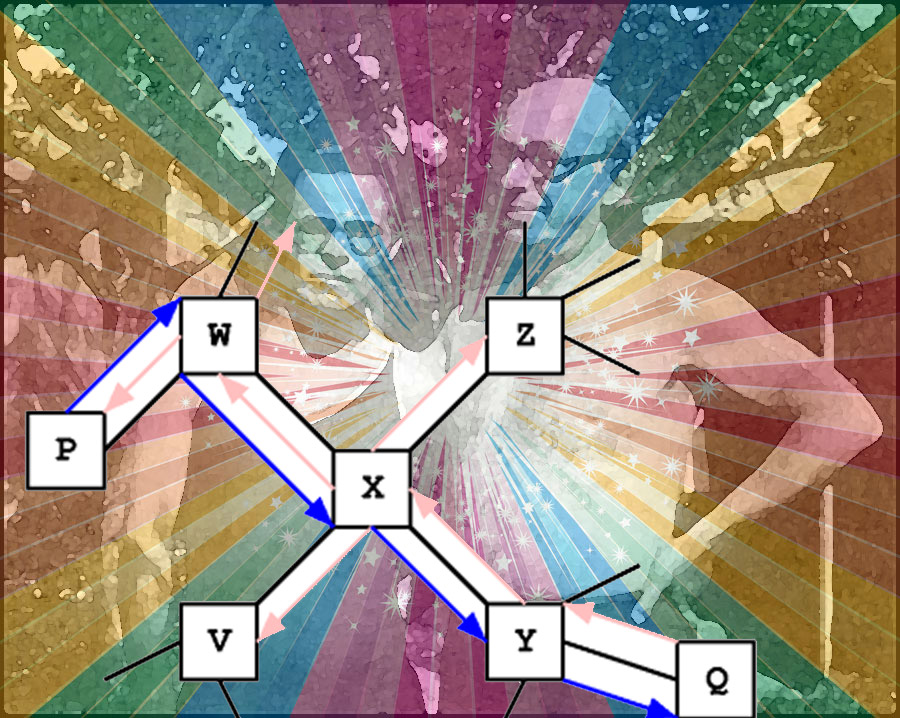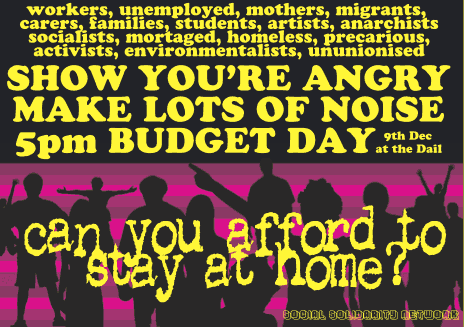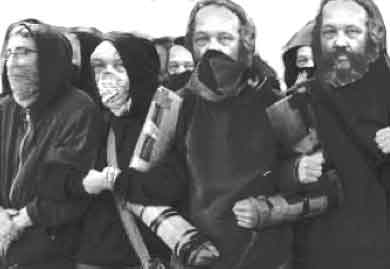Over 30 years of anarchist writing from Ireland listed under hundreds of topics
Anarchist organisation
WSM Points of Unity Explained: 3 - Platformism (1)
'3. We identify ourselves as anarchists and with the "platformist", anarchist-communist or especifista tradition of anarchism. We broadly identify with the theoretical base of this tradition and the organisational practice it argues for, but not necessarily everything else it has done or said, so it is a starting point for our politics and not an end point.’
Sometimes a person associates anarchism with chaos, with a complete disinterest in organisation, system building, and regularity. This is a critical misunderstanding of the anarchist project. The WSM practices a form of anarchism which strives to be highly organised and coherent, learning as much as we can from attempts in the past to create a free world.
WSM Points of Unity Explained: 4 - Platformism (2)
'4. The core ideas of this tradition that we identify with are the need for anarchist political organisations that seek to develop:
- Theoretical Unity
- Tactical Unity
- Collective Action and Discipline
- Federalism’
Federalism is an organisational structure based on “the free agreement of individuals and organisations to work collectively towards a common objective”. It is finding the best balance between independence and coherence. This means, for example, that all decisions are made by those affected by them as opposed to centralism, where decisions are made by a central committee for those affected by them. Or that while all WSM branches are united under a common national policy, they can make their own local decisions. It also means that we have no leaders or officials with higher authority than others. Rather, we have 'officers' who are delegated temporary authority to perform certain tasks as mandated by the membership (for instance, to be treasurer).
Perspectives for Struggle and Revolution
What this Paper is
What we summarise below is what the WSM has collectively agreed are the prospects for struggle in the short and medium term both in terms of global and local capitalism but more importantly of the existing movements and struggles and those we think are coming into existence. It should be read in conjunction with ‘The Role of the Anarchist Organisation’ which is the long term strategic view within which these short and medium terms considerations are shaped. Fundamentally we think ‘kick it till it breaks’ leads to burnout and inactivity. Sustained organising over decades requires a collective understanding and identification of the moments of opportunity scattered through the periods of preparation and experimentation.
Perspectives for Struggle and Revolution
A Workers Solidarity Movement Position Paper
Routes to freedom - the platform, its shortcomings and the WSM practise - does it remain relevant?
 One of the key foundation documents for the Workers Solidarity Movement is the ‘Organizational Platform of the General Union of Anarchists (Draft)’ This text was written in Paris in 1926 by a group that included exiled Russian and Ukrainian anarchists and was very influenced by the lessons they drew from the Russian Revolution. Three of the authors -- Nestor Makhno, Ida Mett, Piotr Archinov -- were then and now very well known anarchists, the remaining two -- Valevsky and Linsky -- I know relatively little about.
One of the key foundation documents for the Workers Solidarity Movement is the ‘Organizational Platform of the General Union of Anarchists (Draft)’ This text was written in Paris in 1926 by a group that included exiled Russian and Ukrainian anarchists and was very influenced by the lessons they drew from the Russian Revolution. Three of the authors -- Nestor Makhno, Ida Mett, Piotr Archinov -- were then and now very well known anarchists, the remaining two -- Valevsky and Linsky -- I know relatively little about.
In this article I intend to examine whether this text has any relevance to anarchist organising today, some 90 years after it was drafted. In addition, what can we say about its shortcomings? Finally, I will look at some of the confusion the WSM ran into when trying to follow it.
Role of the Anarchist Organisation
WSM position paper on the role of the anarchist organisation, as agreed at National Conference October 2014.
The experience of the Social Solidarity Network
 The Social Solidarity Network came into existence in the Autumn of 2009 in Dublin as an initiative of the Workers Solidarity Movement. It faded out of existence a few short months later and never amounted to all that much in the interim beyond a couple of meetings, a leaflet distribution at a mass ICTU march and a badly organised and executed protest at the Dail on budget day. Nevertheless there are some useful lessons (mostly of the ‘how not to do it variety’) to be taken from its short existence.
The Social Solidarity Network came into existence in the Autumn of 2009 in Dublin as an initiative of the Workers Solidarity Movement. It faded out of existence a few short months later and never amounted to all that much in the interim beyond a couple of meetings, a leaflet distribution at a mass ICTU march and a badly organised and executed protest at the Dail on budget day. Nevertheless there are some useful lessons (mostly of the ‘how not to do it variety’) to be taken from its short existence.
The role of the anarchist organisation - archived version from before Oct 2014
What the Workers Solidarity Movement see the role of the anarchist organisation as being. How we see its relationship with and as part of the working class. How we see a revolution developing. This is an old version of the position paper - the current version is at http://www.wsm.ie/c/role-anarchist-organisation-policy
Summit Protests and Networks
 With the emergence of the summit protest movement into the public eye after J18 and Seattle, anarchism gained an influence way beyond what the numbers of anarchists and the level of anarchist organisation might have led you to predict. Quite quickly in the English speaking world, anarchism emerged from being a fairly obscure and historical critique of the left to become one of the main poles in the globalisation movement.It was not the long-existing anarchist organisations that achieved this. For the most part it was a new generation of activists using much more informal methods of organisation and communication. Rather than seeking to build one powerful and united organisation, they built thousands of small, informal and often quite short-lived ones. In fact 'built' is probably too strong a word for a process that in many cases consisted of a few friends coming together to travel to a protest and act together during it.
With the emergence of the summit protest movement into the public eye after J18 and Seattle, anarchism gained an influence way beyond what the numbers of anarchists and the level of anarchist organisation might have led you to predict. Quite quickly in the English speaking world, anarchism emerged from being a fairly obscure and historical critique of the left to become one of the main poles in the globalisation movement.It was not the long-existing anarchist organisations that achieved this. For the most part it was a new generation of activists using much more informal methods of organisation and communication. Rather than seeking to build one powerful and united organisation, they built thousands of small, informal and often quite short-lived ones. In fact 'built' is probably too strong a word for a process that in many cases consisted of a few friends coming together to travel to a protest and act together during it.
Bakunin's ideas on revolutionary organisation

The Russian revolutionary Micheal Bakunin is often presented as the 'founding father' of anarchism. He was a larger than life figure whose disputes with Marx in the 1st international form an essential role in the clarification of the role of the vanguard and of the state in the revolutionary process. Yet his concrete ideas on anarchist organisation are not so well knowm. Andrew N. Flood takes a closer look at them.
About the Organizational Platform of the General Union of Anarchists
Anarchists are constantly thinking about how society is and how it could be. We strive towards the ideal of a free and democratic society. We know that, in order to get there, it will be necessary to tear down the present authoritarian system of government. Our struggle for freedom throws up many areas of controversy and debate. One of these has always been, and always will be, how do we get to a revolution? How do we organise for change? An important contribution to this debate was the Organisational Platform of the Libertarian Communists*, a document which was written in 1926 by a group of exiled Russian and Ukrainian anarchists, and which still has much to offer to today's debates around the question of organisation.

